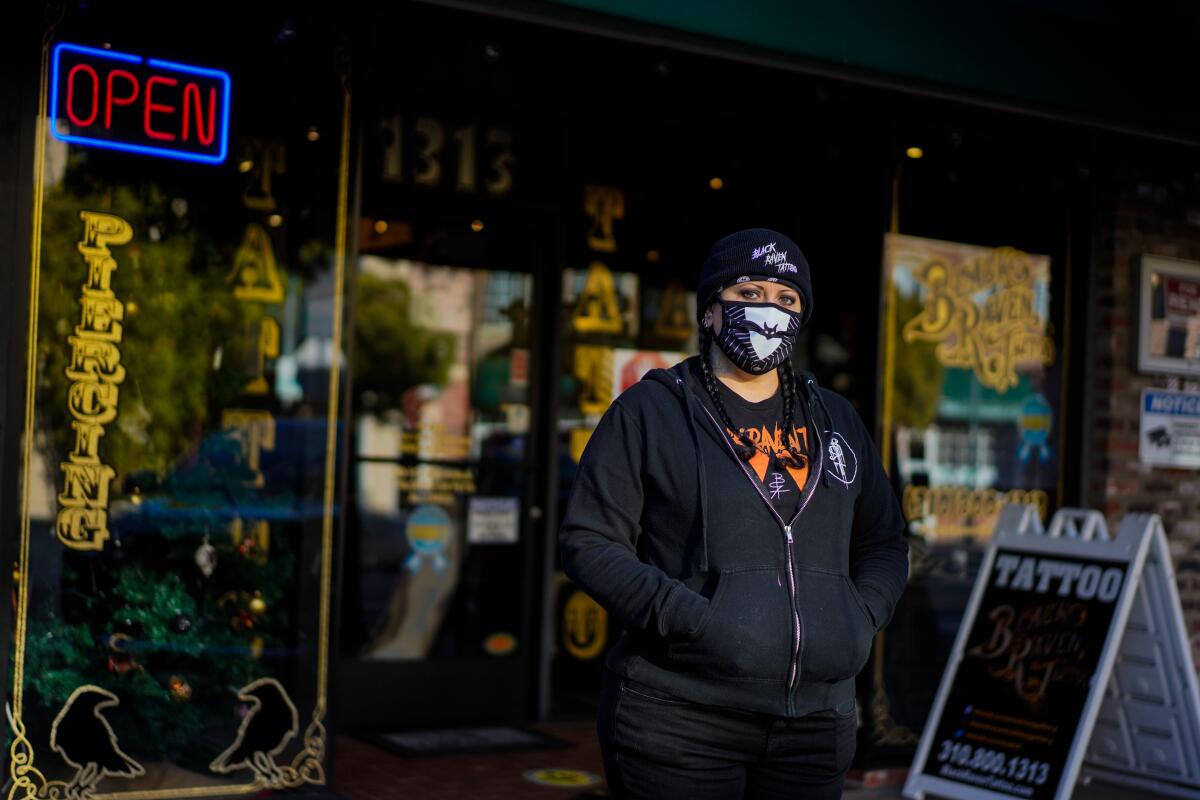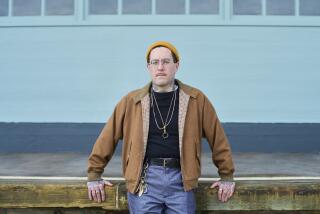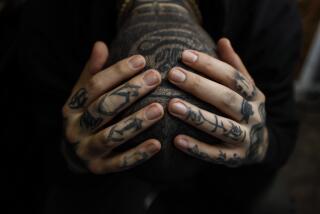Are tattoos free speech that should override coronavirus restrictions? California artists say yes

Unsure whether he could hold a funeral for his grandmother who succumbed to COVID-19, the man turned to Tiffany Mitchell for another way to memorialize her.
He “couldn’t just get the phone call and go, ‘OK, she’s dead’ and just leave it at that and do nothing at all,” said Mitchell, who owns Black Raven Tattoo in Torrance. “For a lot of people, a tattoo is one of the only outlets they have to honor somebody.”
For the record:
10:53 a.m. Dec. 26, 2020An earlier version of this article referred to U.S. District Judge Dale Fischer as a man. Fischer is a woman.
With a whirring tattoo gun, she emblazoned the words “Grandma RIP” on his forearm.
This was during a brief window beginning in October, when Los Angeles County tattoo parlors opened after being shuttered for the second time by coronavirus restrictions. A state order that went into effect earlier this month brought about a third wave of closures across most of California.
Mitchell and two other Southern California tattoo parlor owners have sued Gov. Gavin Newsom over the mandated closures. On Wednesday, a federal judge denied their request to temporarily lift the restrictions.
For public health purposes, the state lumps tattoo parlors into the personal care services category that includes nail salons and barbers — all requiring prolonged, close contact with clients.
But unlike nail and hair styling, tattoos are considered a form of constitutionally protected free speech in some jurisdictions.
About a decade ago, the U.S. 9th Circuit Court of Appeals, which covers California and other Western states, ruled in a case involving an Hermosa Beach shop that a “tattoo itself, the process of tattooing, and even the business of tattooing are ... purely expressive activity fully protected by the 1st Amendment.”
In her Wednesday ruling, U.S. District Judge Dale Fischer said state officials did not specifically target the speech expressed by the tattooing. The state’s public health interest in containing the coronavirus trumps the tattoo parlors’ free speech interest, she said.
Although their stores are closed, Fischer said in her order that tattoo artists could plan future designs or create temporary tattoos for clients.
Robert Moest, an attorney for the tattoo artists, said Fischer’s suggestions showed a misunderstanding of the art form.
“If you put ‘Mom’ on your arm in magic marker, it might not be as meaningful to Mom,” said Moest, who won free speech protections for tattoos in the Hermosa Beach case and others.
Tattoo artists say they undergo rigorous annual training that covers blood-borne pathogens and contamination risks. Getting inked during a pandemic is safe, they say.
“We have the same practices and procedures, say, a dentist would have,” Mitchell said.
Recalling a recent trip to a crowded Target, tattoo artist Glenn West said his business was “much safer.” West, who owns Palace Art Tattoo in Thousand Oaks, is a plaintiff in the lawsuit.
Not all health experts are on board. Natascha Tuznik, UC Davis Health associate professor of infectious disease, called tattooing “one of the riskiest services you can get,” in a Q&A published in June.
She says the close physical contact, coupled with piercing the skin, means elevated risk, regardless of sterilization techniques.
Amid the health and constitutional debates, the artists say there’s an urgent issue at stake: They’re trying to keep a roof over their heads and food on the table. It’s a painful refrain echoed by business owners across many sectors struggling during the pandemic.
West said he had burned through savings and a government loan.
“That covered the first shutdown. Like, what now?” said West, who has three children. Four other tattoo artists in his shop are also suffering from the closure, he said.
Mitchell, who has a young daughter, said she was also fighting to keep the lights on. Early in the pandemic, she took out a small-business loan for nearly $90,000 and is facing mounting debt as interest racks up.
Mitchell and West both owe their tattoo parlors’ existence to battles against bans in their respective cities, with Moest as their attorney.
Now, after the judge ruled against them this week, they’re grappling with whether to push forward with their coronavirus lawsuit.
“I’m not one to give up. I never have been, really,” West said, adding that he still needed to confer with his co-plaintiffs.
During the few weeks his shop was open, there was a steady stream of requests for pandemic-related tattoos.
He has inked cartoon versions of the spiky virus on people, with facial features and sometimes the year “2020” written alongside.
One client asked for a tattoo of himself sitting on the couch playing video games — his quarantine hobby.
West anticipates that similar requests will roll in when he is able to reopen.
“People are going to want to forget about it,” he said, “but also remember it.”
More to Read
Sign up for Essential California
The most important California stories and recommendations in your inbox every morning.
You may occasionally receive promotional content from the Los Angeles Times.











